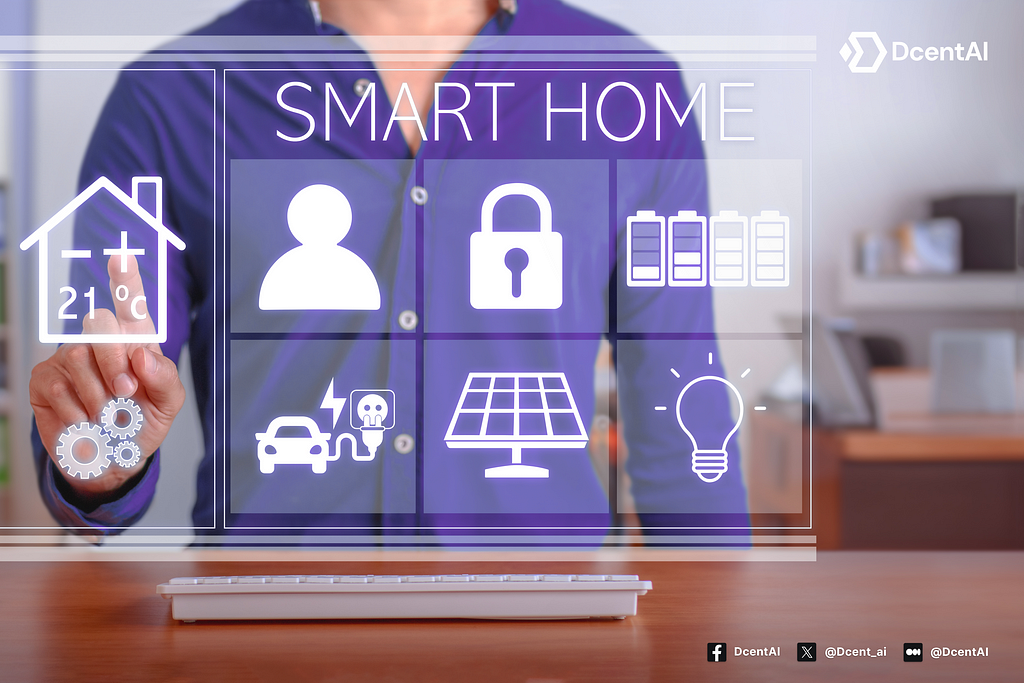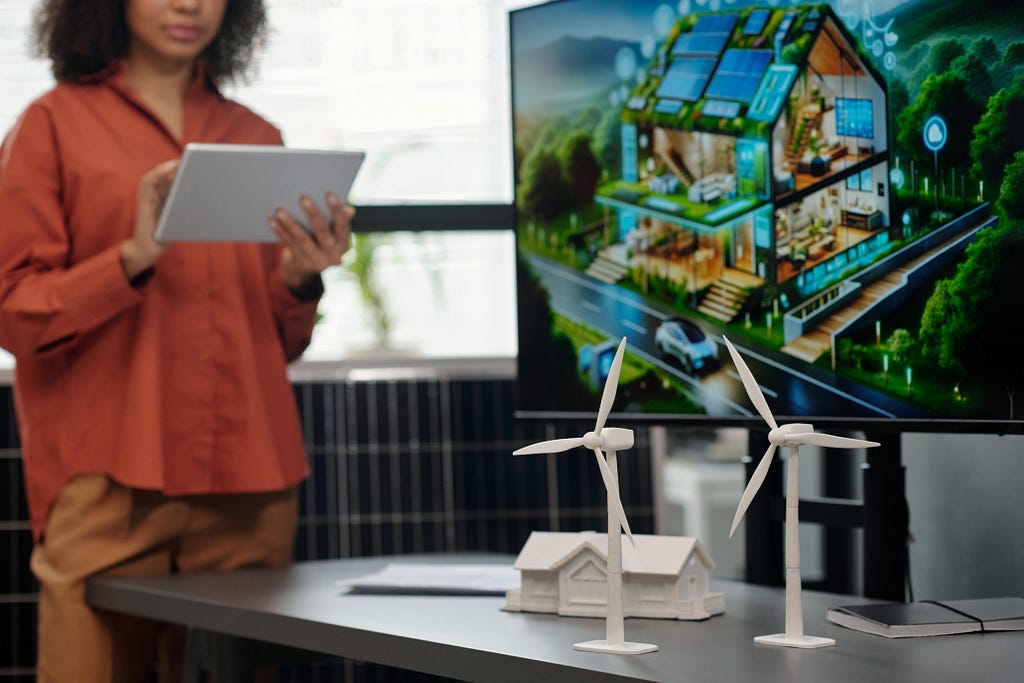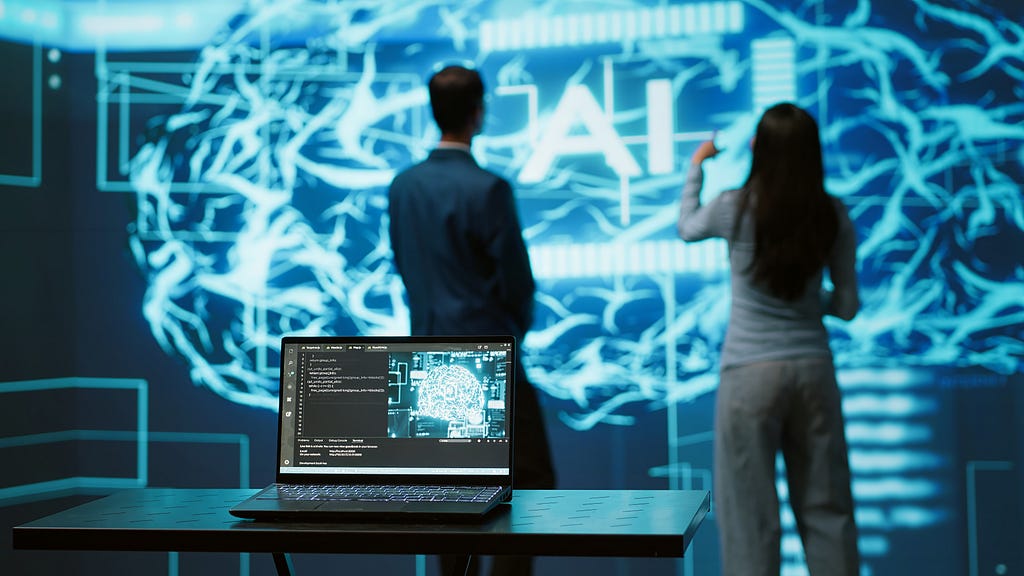Decentralized AI for Real-Time Game Analytics and Player Behavior

Solar, wind, and other renewables play a crucial part in meeting the world’s energy needs, and their growing significance has spurred a dramatic move toward sustainable power sources. However, solidifying these renewable energy sources into conventional frameworks presents particular challenges, including an influx of power supply, storage restrictions, and real-time energy operation necessities.
Decentralized AI is a game-changing tool that offers creative solutions to improve grid operations and smoothly incorporate renewable energy as the complexity of energy distribution rises.Through decentralized AI, energy grids may gain from real-time data processing, predictive analytics, and dynamic load balancing, ensuring more robust and effective management. DcentAI is a significant force behind advancements in energy framework management thanks to its decentralized network, which empowers more brilliant, sustainable energy frameworks worldwide.
Become a pioneer of DcentAI community!Decentralized AI in Energy Grid ManagementDecentralized AI improves energy grid operation through real-time data processing and increased grid stability. Issues with network structure may be identified beforehand by harnessing AI-driven predictive maintenance, reducing time-out, and refining performance. Decentralized infrastructures guarantee that energy supply and demand are viably coordinated by assessing real-time data from numerous sources to deliver dynamic load balancing.
Moreover, real-time energy usage monitoring made possible by edge computing permits prompt modifications to energy distribution, which lowers inefficiencies and enhances network responsiveness. Combining these qualities promotes a more adaptable, efficient, and robust energy grid framework that smoothly incorporates renewable energy sources.
Integrating Renewable Energy with Decentralized AIThe inherent unpredictability and sporadic nature of renewable energy sources, including solar, wind, and hydroelectric control, pose significant challenges in their integration into traditional energy frameworks. Compared to conventional energy sources, renewable energy output is inconsistent. It varies based on weather conditions, time of day, and various other influences, complicating the maintenance of a reliable energy supply. By facilitating real-time data analysis and predictive modeling, decentralized AI can help adjust the supply of renewable energy with varying demands, therefore addressing these issues. Decentralized AI frameworks save waste and maintain framework stability by dynamically adjusting energy use to meet the availability of renewable electricity.
AI-powered optimization techniques maximize the efficiency of renewable energy sources, such as optimizing wind turbine output or adjusting solar panel performance based on environmental conditions. Decentralized AI is essential in operating smart grids and Distributed Energy Resources( DERs), facilitating a more localized and adaptable approach to managing energy generation and usage. These systems promote effective collaboration among different energy producers and consumers, enhancing the grid’s dependability and helping incorporate renewable energy sources into the larger energy infrastructure.
Benefits of Decentralized AI for Energy Grid Management and Renewable Integration
Decentralized AI brings transformative advantages to energy grid management and renewable integration. Leveraging distributed intelligence addresses inefficiencies, enhances grid resilience, and ensures energy resources’ secure, scalable optimization. Below are vital benefits illustrating its impact.
Improved Efficiency and Reduced Energy WasteDecentralized AI optimizes energy production, delivery, and consumption, increasing energy grid productivity. It reduces supply and demand imbalances by analyzing data from several sources in real-time, including energy use patterns and renewable output levels. Along with improving the use of renewable resources and lowering energy waste, it guarantees that additional energy is stored or redirected where required. Artificial intelligence (AI) may, for instance, estimate periods of high demand and modify framework operations suitably, lowering reliance on fossil fuels during these times.
Enhanced Grid Resilience Through Decentralized Decision-MakingDecentralized AI increases grid adaptability by empowering localized decision-making. In contrast to centralized AI frameworks, which are vulnerable to single points of failure, decentralized AI frameworks divide decision-making among several nodes. It allows the network to respond promptly to disruptions, like power blackouts or changes in the renewable energy supply. Utilizing decentralized insights, energy frameworks become more adaptable and resilient to unexpected obstacles, ensuring a consistent power supply.
Increased Scalability for Managing Large-Scale Renewable IntegrationsWith the growing demand for renewable energy sources, including wind turbines and solar farms, conventional grid management frameworks struggle to scale effectively. Decentralized AI offers a scalable alternative by distributing data processing duties and artificial intelligence across a network. This method allows the framework to manage the challenges of integrating several renewable energy installations. With decentralized AI, grids can seamlessly manage diverse energy inputs and dynamically allocate resources, supporting the transition to a more sustainable energy future.
Real-Time Energy Optimization With Data Privacy and SecurityDecentralized AI makes real-time energy framework optimization possible and ensures data privacy and security. Sensitive information concerning energy use patterns is kept private and secure by processing it locally at the edge. AI algorithms simultaneously examine this data to discover inefficiencies, adjust supply and demand, and optimize the energy stream. The tamper-proof records of energy exchanges provided by blockchain technology, which is incorporated into decentralized AI frameworks, further improve data security and promote transparency and trust in energy management.
Use Cases and Real-world ApplicationsDecentralized AI has transformed energy frameworks by incorporating cutting-edge technology into distribution networks and smart grids. These advancements make predictive analytics, energy flow optimization, and real-time monitoring possible. For instance, Brooklyn Microgrid, a blockchain-based platform by Brooklyn-based firm LO3 Energy, leverages decentralized artificial intelligence to facilitate peer-to-peer energy exchange among locals. The innovation optimizes energy utilization and reduces reliance on centralized power sources by empowering solar-equipped homes to sell extra energy to their neighbors directly.
National Grid ESO in the UK is also utilizing decentralized AI to improve load estimating and grid balancing, which helps maintain the stability of its framework, which relies intensely on renewable energy. Distributed energy resources (DERs) and AI-driven analytics can also improve the system’s capacity to forecast energy surpluses and deficiencies and provide real-time remedies without putting undue strain on the grid.
These use cases may help consumers and suppliers communicate more effectively in energy markets, as decentralized AI promotes efficiency and energy democratization. DcentAI is poised to contribute further to such applications, offering robust decentralized AI solutions tailored for energy distribution and grid management.
Challenges in Implementing Decentralized AI for Energy Systems
Using decentralized AI in energy frameworks must overcome several hurdles to realize its full potential. These challenges include supervising distributed systems and ensuring adherence to legal requirements. Below, we explore these issues and how solutions like DcentAI can effectively tackle them.
Data SynchronizationEnergy systems depend on consistent and accurate data to ensure reliable operations. Keeping data synchronized among distributed nodes is a significant difficulty in a decentralized AI framework since even slight differences can cause network instability. Furthermore, smooth communication is essential for cooperation between partners, including energy producers, distributors, and consumers.
DcentAI can use sophisticated federated learning frameworks to process data in real-time and update models across nodes without sacrificing data consistency. Its blockchain-powered network ensures immutable and synced data records, lowering disparities and boosting operational effectiveness.
Infrastructure Robustness and Managing Real-Time Data ProcessingThe demand for a robust infrastructure to handle real-time energy data is critical, as energy systems require rapid decision-making to balance supply and demand. However, building such infrastructure involves significant costs and technical challenges.
DcentAI’s decentralized ecosystem leverages distributed computing power and edge AI, enabling real-time data processing close to data sources. This approach minimizes latency and ensures faster decision-making while reducing the reliance on centralized infrastructure investments.
Regulatory ComplianceOperating decentralized energy systems involves navigating a complex web of regional and international regulations. These include data privacy laws, energy trading rules, and emission control standards, which can vary significantly across jurisdictions.
DcentAI ensures compliance by integrating robust data encryption and governance protocols into its platform. Its blockchain infrastructure provides transparent transaction records and auditable compliance trails, helping energy providers more effectively adhere to regulatory requirements.
Interoperability Between Legacy and Decentralized Energy SystemsEnergy grids often rely on legacy systems that must be designed to integrate modern decentralized AI technologies. Achieving seamless interoperability while maintaining the reliability of existing systems can be a considerable hurdle. DcentAI’s platform supports modular and adaptable solutions, enabling smooth integration with legacy systems. By using APIs and middleware that bridge traditional grids with decentralized AI-driven tools, DcentAI facilitates a gradual transition to modern energy management practices.
How DcentAI Can Support Energy Grid ManagementDcentAI’s decentralized network provides innovative solutions to support efficient and resilient energy grid management. DcentAI can improve grid stability through dynamic load balancing, predictive maintenance, and real-time monitoring by utilizing decentralized data processing and AI-driven insights. Its network can optimize energy distribution and demand estimating across smart networks, empowering the smooth integration of renewable energy sources like wind and solar. Through partnerships with energy providers and pilot projects, DcentAI can demonstrate its impact in enabling distributed energy resources (DERs) and improving grid reliability. Its scalable and secure infrastructure ensures that data privacy and compliance are maintained while driving innovation in energy management.
In SummaryDecentralized AI has the potential to completely change energy network management and the integration of renewable energy sources. It can solve issues like grid instability, variability, and inefficiency while facilitating real-time data processing, predictive maintenance, and dynamic load balancing.
It will help create smarter, more flexible energy frameworks and reduce the smooth integration of renewable energy sources.This development is driven by DcentAI, which provides a decentralized network suited to traditional energy networks’ requirements. With its cutting-edge solutions, alliances, and commitment to sustainability, DcentAI is facilitating the shift to scalable, secure, and efficient energy frameworks that support the objectives of a sustainable future.
Become a pioneer of DcentAI community!To learn more about DcentAI, visit our Facebook and X accounts.Decentralized AI for Energy Grid Management and Renewable Integration was originally published in Coinmonks on Medium, where people are continuing the conversation by highlighting and responding to this story.
